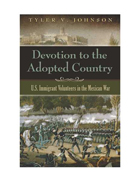
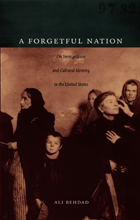
Behdad shows how political, cultural, and legal texts have articulated American anxiety about immigration from the Federalist period to the present day. He reads texts both well-known—J. Hector St. John de Crèvecoeur’s Letters from an American Farmer, Alexis de Tocqueville’s Democracy in America, and Walt Whitman’s Leaves of Grass—and lesser-known—such as the writings of nineteenth-century nativists and of public health officials at Ellis Island. In the process, he highlights what is obscured by narratives and texts celebrating the United States as an open-armed haven for everyone: the country’s violent beginnings, including its conquest of Native Americans, brutal exploitation of enslaved Africans, and colonialist annexation of French and Mexican territories; a recurring and fierce strand of nativism; the need for a docile labor force; and the harsh discipline meted out to immigrant “aliens” today, particularly along the Mexican border.
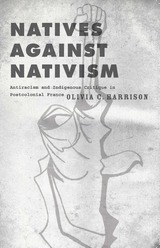
Examining the intersection of Palestine solidarity movements and antiracist activism in France from the 1970s to the present
For the pasty fifty years, the Palestinian question has served as a rallying cry in the struggle for migrant rights in postcolonial France, from the immigrant labor associations of the 1970s and Beur movements of the 1980s to the militant decolonial groups of the 2000s. In Natives against Nativism, Olivia C. Harrison explores the intersection of anticolonial solidarity and antiracist activism from the 1970s to the present.
Natives against Nativism analyzes a wide range of texts—novels, memoirs, plays, films, and militant archives—that mobilize the twin figures of the Palestinian and the American Indian in a crossed critique of Eurocolonial modernity. Harrison argues that anticolonial solidarity with Palestinians and Indigenous Americans has been instrumental in developing a sophisticated critique of racism across imperial formations—in this case, France, the United States, and Israel.
Serving as the first relational study of antiracism in France, Natives against Nativism observes how claims to indigeneity have been deployed in multiple directions, both in the ongoing struggle for migrant rights and racial justice, and in white nativist claims in France today.
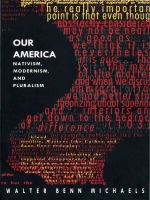
“We have a great desire to be supremely American,” Calvin Coolidge wrote in 1924. That desire, Michaels tells us, is at the very heart of American modernism, giving form and substance to a cultural movement that would in turn redefine America’s cultural and collective identity—ultimately along racial lines. A provocative reinterpretation of American modernism, Our America also offers a new way of understanding current debates over the meaning of race, identity, multiculturalism, and pluralism.
Michaels contends that the aesthetic movement of modernism and the social movement of nativism came together in the 1920s in their commitment to resolve the meaning of identity—linguistic, national, cultural, and racial. Just as the Johnson Immigration Act of 1924, which excluded aliens, and the Indian Citizenship Act of the same year, which honored the truly native, reconceptualized national identity, so the major texts of American writers such as Cather, Faulkner, Hurston, and Williams reinvented identity as an object of pathos—something that can be lost or found, defended or betrayed. Our America is both a history and a critique of this invention, tracing its development from the white supremacism of the Progressive period through the cultural pluralism of the Twenties. Michaels’s sustained rereading of the texts of the period—the canonical, the popular, and the less familiar—exposes recurring concerns such as the reconception of the image of the Indian as a symbol of racial purity and national origins, the relation between World War I and race, contradictory appeals to the family as a model for the nation, and anxieties about reproduction that subliminally tie whiteness and national identity to incest, sterility, and impotence.
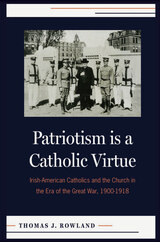

Remembering Paradise studies three major eighteenth-century nativist scholars in Japan: Kada no Azumamaro, Kamo no Mabuchi, and the celebrated Motoori Norinaga. Peter Nosco demonstrates that these scholars, frequently depicted as the formulators of rabid xenophobia, were intellectuals engaged in a quest for meaning, wholeness, and solace in what they perceived to be disordered times. He traces the emergence and development of their philosophies, identifying elements of continuity into the eighteenth century from the singular Confucian-nativist discourse of the seventeenth century. He also describes the rupture between nativism and Confucianism at the start of the eighteenth century and the quest for ancient, distinctly Japanese values.
The emphasis on patriotism and nostalgia in the works of these three scholars may have relevance to the kind of nationalism emerging in Japan in the 1980s, manifested in a renewed interest in visiting one's home place and in the history and culture of the seventeenth through mid-nineteenth centuries. The current fusion of nationalism and nostalgia can perhaps be better understood through Nosco's analysis of comparable sentiments that were important in earlier times.
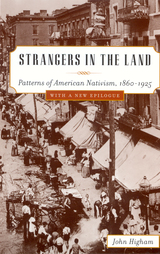
Strangers in the Land is, then, a history of public opinion, whose purpose is to show how nativism evolved in society and in action. Higham seeks to explain what could inflame xenophobia and who resisted it. He saw his work as part of a renewed interest in the study of nationalism following the national upheavals in the wake of the McCarthy hearings. Surely Higham's mentor at the University of Wisconsin, intellectual historian Merle Curti, influenced Higham's approach in seeking to examine the power of nationalism as an idea. Also influential was the intellectual climate of the 1950s with its of distrust of ideology and distain of prejudice. Higham admits being repelled by the nationalist delusions of the Cold War, again helping to explain why his study concentrates on seeking some explanation for the irrational and violent outbreaks. The book thus focuses on points of conflict, "antagonisms that belong within ideologies of passionate national consciousness." For example, Higham's explains the 100 percent American movement in terms of progressive ideals and the desire of Americans to shape immigrants into a particular ideal of "Americanness" through education and assimilation. This intellectual construct eventually gave way to the racial thinking to which Higham assigns much influence in the efforts to restrict immigration. Ideology is also central to his chapter on the history of the idea of racism in which he argues that Anglo-Saxon nationalism, literary naturalism and a nascent understanding of genetics combined to bring forth arguments for immigration restriction to preserve the racial purity of the American people. Thus, key for Higham's argument is the power of ideas in shaping individual behavior and thereby shaping history.
This text is an absolute must-read for anyone seeking to understand American nativism and the darker side of nationalism.
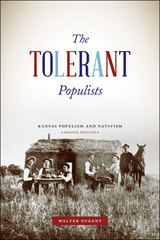
Historians wrote approvingly of the Populists up into the 1950s. But with time and new voices, led by historian Richard Hofstadter, the Populists were denigrated, depicted as demagogic, conspiratorial, and even anti-Semitic.
In a landmark study, Walter Nugent set out to uncover the truth of populism, focusing on the most prominent Populist state, Kansas. He focused on primary sources, looking at the small towns and farmers that were the foundation of the movement. The result, The Tolerant Populists, was the first book-length, source-based analysis of the Populists. Nugent’s work sparked a movement to undo the historical revisionism and ultimately found itself at the center of a controversy that has been called “one of the bloodiest episodes in American historiography.”
This timely re-release of The Tolerant Populists comes as the term finds new currency—and new scorn—in modern politics. A definitive work on populism, it serves as a vivid example of the potential that political movements and popular opinion can have to change history and affect our future.
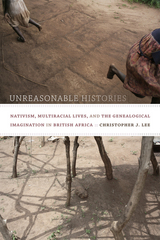
READERS
Browse our collection.
PUBLISHERS
See BiblioVault's publisher services.
STUDENT SERVICES
Files for college accessibility offices.
UChicago Accessibility Resources
home | accessibility | search | about | contact us
BiblioVault ® 2001 - 2024
The University of Chicago Press









